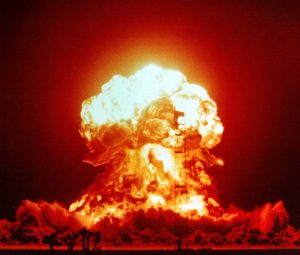Amid the political flux surrounding the fate of European ties with the United States, U.S. President Donald Trump issued a somber yet fair assessment of the global nuclear order. Questioning the rationale of the nuclear arms race between the United States, Russia, and China, Trump reflected that “there is no reason for us [presumably meaning the three aforementioned states] to be building brand new nuclear weapons. We already have so many.”
Indeed, as Trump acknowledged, these countries possess enough nuclear weapons to destroy the world multiple times. This fear of nuclear Armageddon, as Trump has repeatedly cautioned, prompted a statement from the White House indicating the U.S. desire to pursue nuclear arms control dialogues with Russia and China to achieve “denuclearization.”
While different presidents have pursued the lofty aims of denuclearization for decades, Trump’s announcement should by no means be taken lightly. For starters, Trump is hardly an advocate for arms control agreements – his first term witnessed the U.S. withdrawal from the Intermediate-Range Nuclear Forces Treaty and Open Skies Agreement, as well as abrogation of the Iran nuclear deal. His combative approach to arms control meant that his administration prioritized imposing new demands over seeking stability. Indeed, Trump once insisted that China be included in the discussions of any future Strategic Arms Reduction Treaty (START), which was outrightly rejected by China.
Hence, with Trump once again cajoling China and Russia to the negotiation table, the world must capitalize on this political will and ensure forward momentum toward arms control negotiations. This requires careful management and calibration of steps toward the end goal of denuclearization.
Regrettably, under the backdrop of a worsening security climate and increasingly acrimonious ties between Washington and Beijing, anchoring talks around the aim of denuclearization appears too far-fetched. Considering the lack of dialogues between the three, Moscow, Beijing, and Washington are in dire need of an agenda that focuses on immediate and tangible steps toward strategic stability, yet still paves the way for future denuclearization discussions.
Therefore, a crucial starting point would be to reaffirm and reinforce the moratorium on nuclear weapons testing. Targeting this aspect of arms control would have firm foundations.
First, it would check a worrying trend of apparent enthusiasm for resuming nuclear weapons testing. Robert O’Brien, a former national security adviser in the first Trump administration, called for the United States to not restrict itself by merely using computer models in tests for reliability and safety in its new nuclear weapons. Indeed, it was reported that senior U.S. leaders have even discussed the possibility of resuming nuclear weapons testing for the first time in 28 years. Similarly, Russian Deputy Foreign Minister Sergey Ryabkov refused to reject the possibility of resuming nuclear weapons tests, instead opting to term that as an “open question.” This followed President Vladimir Putin’s chilling past remarks that “if necessary, we [Russia] will conduct tests.” Apart from Russia and the U.S., observers have also speculated that Chinese activity in its Lop Nur range – digging a vertical shaft into the earth – suggests that China is on the cusp of nuclear weapons testing again.
Second, reaffirming pledges to not resume nuclear weapons testing may serve to inject new life to the Comprehensive Nuclear Test-Ban Treaty (CTBT). The CTBT was dealt a major blow in 2023 when Russia withdrew its ratification of the treaty, bringing the total of signatory states that have not ratified the CTBT to six – including China, the U.S., and now Russia. Pledging to not resume testing, although it would not necessarily lead to ratification of the CTBT, it can certainly reinvigorate discussions on the necessity and benefits of doing so.
Lastly, such pledges represent low-hanging fruit that does not cost much political capital to bring to fruition. Given that it has been decades since Washington, Moscow, and Beijing last conducted a nuclear weapons test, reaffirming the existing moratoriums would not impose any significant political costs, nor will it cede substantial military or strategic grounds to the parties involved. Conversely, pledging to not resume nuclear weapons testing could serve as a pragmatic confidence-building mechanism that may lay the foundation for more dialogues and engagements leading to denuclearization.
Trump’s avowed reputation as a shrewd dealmaker means that not only must he initiate and conclude deals to a satisfactory level, but he must also close them quickly. With Trump already setting the ball rolling, the United States could take the lead in reaffirming pledges not to resume nuclear weapons testing. Doing so would help restore the credibility of U.S. leadership, which has taken a hit in recent weeks, while also setting the stage for further action. More importantly, as Russia has promised that it would not resume testing so long as the U.S. refrains from doing so, Washington’s reaffirmation could trigger a chain reaction, encouraging similar commitments from nuclear powers.
As Steven Pifer sharply noted, the resumption of nuclear testing could open the door for others to follow suit. By the same logic, reaffirming and reinforcing the moratorium on nuclear weapons testing could help close that door even tighter. This could serve as a meaningful first step in the broader pursuit of denuclearization.

































